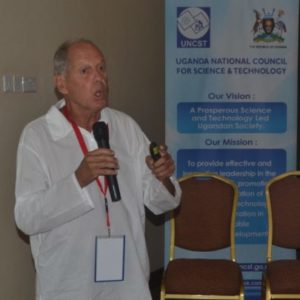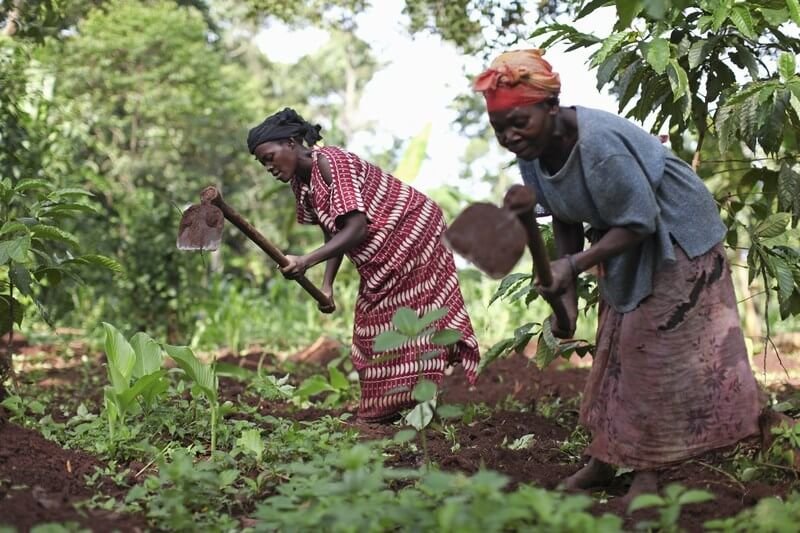Ugandan scientists converged this summer at a biosafety forum in Kampala organized by Uganda’s national council for science and technology to share experiences on biotechnology research. The forum that brings legislators and communicators to join scientists, also had a visiting professor from Brazil — Paulo Paes De Andrade. His presence was enriching, especially his experience with biosafety regulations in Brazil and ongoing works with gene editing.
The annual event brings technology developers and regulators together. Uganda has the largest number of transgenics in trials in Africa. But in the absence of a comprehensive biosafety law, scientists are finding it difficult to proceed beyond confined trials. To help spur government action, biotech supporters working with the Uganda National Council for Science and Technology invited a prominent Brazilian geneticist to reinforce their case.
Brazil is one of the world’s leading biotech crop centers, and the professor of genetics at the Federal University of Pernambuco, Recife, Brazil, is one its leading proponents. The future in agriculture, he said rests not with aging transgenic technology but in gene editing.

De Andrade explained how scientists worked together to challenge the anti-GMO propaganda campaigns orchestrated by foreign-funded Greenpeace and other advocacy groups — most based in Europe. Now anti-technology groups are focusing on gene editing.
The battlefront became clear, he said, in Cancun, Mexico in 2016 at the United Nation’s Convention on Biological Diversities (CBD). Several “familiar” voices pushed for the moratorium on gene editing, claiming the risks were not known and “more studies” were necessary.
Will the CBD take the “precautionary approach” on gene editing like they did in the Cartagena Protocol on G.E Biosafety?
The Uganda representative at the talk, David Hafashimana, who participated at the CBD conference, confirmed that the moratorium issue was raised but no solid decision was made. It’s expected to be a hot issue at subsequent CBD members meetings.
Anti-GMO activists frequently invoke the so-called “precautionary principle” — an ideological notion that argues that if absolute safety cannot be confirmed in the exercise of a new technology, it should be banned. Of course nothing can be proven safe. But support for the idea by biotechnology critics resulted in its inclusion in the Cartagena Protocol on Biosafety. It has since evolved into a potent tool used by GMO opponents to restrict the introduction of crop biotechnology in the developing world. Several African countries enact laws which cite ambiguous precautionary fears to justify blocking or slowing research. Over the years some African countries — notably Ethiopia and Tanzania — have pushed back against these precautionary rules and NGO activist scare propaganda to amend their laws. Trials are now in advanced stages in those countries.
Uganda looks to gene editing (CRISPR/Cas9) to improve rice and other crops
As most African countries grapple with whether to adopt GE crops, scientists globally are beginning to explore gene editing technology, especially CRISPR/Cas9 in improving crops and medicine. The National Agricultural Crops Resources Research Institute in Uganda has started the process of using CRISPR to develop local rice varieties to resist bacterial blight. Bacterial blight is caused by the bacterial pathogen Xanthomonas campestris. It causes wilting of seedlings and yellowing and drying of leaves.
According to the International Rice Research Institute, yield loss due to bacterial blight can be as high as 70 percent when susceptible varieties are grown in environments favorable to the disease. In Uganda, most of the rice is grown in lowland areas where blight is more virulent. Rice is becoming an important crop in Uganda partly because of the availability of several productive areas around fresh water lakes. Rice also takes little energy to prepare into a meal. The increase in production though is causing environmental degradation of wetlands needed to protect Lake Victoria from pollution but also facilitating rapid drainage during prolonged drought leading to insufficient water for animals.
Other key issues discussed at the Biosafety Forum 2017
Ugandan scientists working on several projects discussed a variety of other issues including: Uganda’s readiness for the environmental impact if GM crops are approved; recent advances in gene drive research in mosquitoes and malaria control; how Africa and Uganda can benefit from synthetic biology; progress made towards developing genetically enhanced vitamin A banana and bacterial wilt resistant banana; and responding to climate change by improving cassava and maize to resist viruses and drought respectively.
Scientists called upon their members of parliament to enact a biosafety law that will help farmers who are losing yields to pests, diseases and drought that could benefit from GE crops, many of which are in advanced stages of development. This historic bill, if passed, has a potential to usher Uganda into the modern age of agriculture.
Isaac Ongu is an agriculturist, science writer and an advocate for science based interventions in solving agricultural challenges in Africa. Follow him on Twitter @onguisaac.































